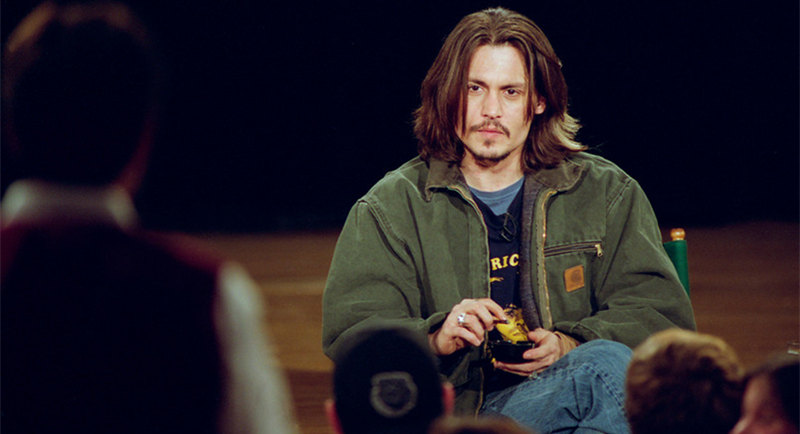“Schoolboy Crush” aspires to tell a complete story about a teacher caught in the scandalous web of a former trick when that student transfers to a boarding school. The teacher, Mr. Aoi (Yoshikazu Kotani), has a one night stand after being dumped by his partner with a trick, Sora Amakami (Atsumi Kanno), a lanky, androgynous boy. Anoi falls in lust with Sora, knowing he can never sexually have him again because of their new relationship. The new student is blind to the admiration of his roommate, Ichiyu (Kawakubo Yuuki), as well as another secret pairing with a school bully.
It’s not the melodramatic soap opera nature of “Schoolboy” which, pardon the pun, crushes the film. Rather, it’s the frantic pace, the inability for the relationships to develop over stretches of time and one too many convenient revelations, not to mention a wealth of unanswered questions. With a running time of just 88 minutes, tension isn’t able to build through any of the characters. If Aoi is so concerned with his administration finding out he slept with a student (when that student wasn’t even a student, but whatever), the film needs slightly more than a voice over and a sprinkling of scenes showing him with a constipated look on his face. His over the top, end of the world acting doesn’t help, either.
The crux of any story involving deep emotions is the ability for the audience to see them evolve from beginning to end. Aside from needing some sexual outlet, we’re never given a reason for Aoi to make the transformation he does. Sora is a bit more easy to read, especially in light of his past, which comes into full view late in the production. We’re able to buy Sora’s alleged beauty on a theory of different strokes for different folks. Maybe even the idea there are so many gay/bisexual characters in the same exact place. A teacher scared for his job. Clandestine relationships in the most unlikely of places. These are all leaps the audience can-but shouldn’t have to-take. Not to sound condescending, but “Schoolboy Crush” feels like a glorified Lifetime movie of the week.
Think about it. The totality of the film centers around lust and love without any deeper meaning. Events play out before our eyes without rhyme or reason. (Maybe they sounded good on paper?) Every character-the leads included-is drawn so poorly we don’t know anything of note about them by the end credits. There’s no depth, no true emotion behind any of them. I have to ask, then, what’s the point?
Perhaps it is to create a live action version of yaoi, a genre of print publications created for women centering on homosexual relationships. If that’s the case, then “Schoolboy Crush” succeeds in spades. Remember how I called this a Lifetime movie? Considering women may very well be the target audience-and not gay men-the use of feminine looking actors and the dream-like quality to the production isn’t entirely out of place.
(It should be noted this is the second film by director Kotaro Terauchi to feature this same subject matter. In 2006, “Boys Love” became a direct-to-DVD phenomenon. He was brought back to create a new film called “Boys Love theatrical edition,” otherwise known as “Schoolboy Crush” in America.)
I’ve spent the last 548 words explaining why this isn’t a very good movie. I will concede that, despite its problems, it’s hard to take your eyes off the screen. It’s not that we’re worried about the eventual outcome of the film or become riveted by every twist and turn the script throws out. Consider it a morbid fascination with just how badly the people on screen can destroy themselves or how ineptly the script handles storylines it introduces then drops like a used condom.
“Crush” can’t even do scenes of titillation right. What is supposed to be a mind-bending, earth-shattering bedroom scene between two characters is bland with no purpose behind it other than to set up the climax. This might pass muster when no other gay themed material is available, but man, it’s awful thread-bare. (I won’t even bother mentioning the tried and true practice of punishing the out gay male for being himself.)
VIDEO:
The 1.78:1 anamorphic transfer is rather pleasant to look at, save for the special photographic effects the production added on set. Chief among them is a layer of fog across nearly every scene in the film. I can understand the intended effect behind creating a dream-like state for this particular story, but there is an unintended consequence of making the entire film appear washed out. During two panning shots, the picture seems to shudder just a little bit, as if the camera on set couldn’t keep up with the action. Blacks are reasonably deep for the majority of the running time, though even they succumb to being drained of color.
AUDIO:
As with their other foreign films, TLA Releasing continues to provide the original, unaltered soundtrack in lieu of the decidedly lower brow English dubs. Here, the Japanese 2.0 mix turns out to be surprisingly robust, full of ambient sounds effects and a friend to the dialogue. I noticed only two very minor cases of audio distortion while the spoken words-despite being in a foreign language-were never obstructed. The sound field is, naturally, rather limited; this isn’t a problem for “Schoolboy Crush” considering its intimate interpersonal nature. Optional English subtitles are included.
EXTRAS:
The disc starts off with a handful of trailers: a generic TLA promo featuring clips of their signature movies along with spots for the already released “Another Gay Sequel,” “3-Day Weekend,” “Bangkok Love Story” and “I Dreamt Under the Water.” Everything except the studio trailer is duplicated under the special features sub menu. Otherwise, the trailer for this film and 11 publicity shots round out the extras. The film is divided into a dozen chapters.
PARTING THOUGHTS:
Without knowing what kind of movie it wants to be-coming of age, sex, relationship, thriller-“Schoolboy Crush” fights an uphill battle to get the audience engaged in the plot. Performances are passable, lending very little to a scatterbrained, thin plot. I can think of two dozen films which are more gay affirming and thrilling than this one. And that is ultimately sad, considering the state of gay cinema today.


